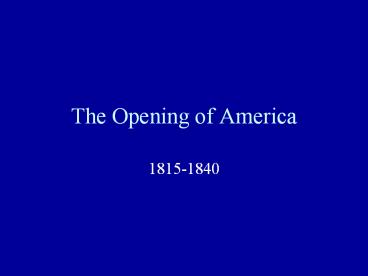The Opening of America - PowerPoint PPT Presentation
1 / 18
Title:
The Opening of America
Description:
The Opening of America 1815-1840 Need for Expansion of Markets U.S. had been tied to international trade; when it suffered (as in War of 1812), so did the U.S ... – PowerPoint PPT presentation
Number of Views:132
Avg rating:3.0/5.0
Title: The Opening of America
1
The Opening of America
- 1815-1840
2
Need for Expansion of Markets
- U.S. had been tied to international trade when
it suffered (as in War of 1812), so did the U.S.
economy - European wars of 1790s (French Revolution) and
1800s (Napoleonic Wars) interfered with American
exports - Most Americans were rural and self-sufficient
couldnt absorb any increase in American
manufacturing
3
Stimuli to Development
- Embargo of 1807 stimulated American industry
- War itself increased demand for manufactured
goods - After Napoleons defeat, European capital flooded
America looking for opportunities
4
A post-War of 1812 program of economic
centralization, designed to promote internal
economic development, was pushed by a group of
aggressive young Republican nationalists. The
economic program included all of the following
EXCEPT
- A. Funding the war debt
- B. A protective tariff
- C. A national bank
- D. Federal subsidies for public works programs
5
John Marshalls Supreme Court decisions sought to
promote American enterprise by all of the
following methods EXCEPT
- a. upholding private contracts
- b. blocking state interference with private
property - c. ruling that Indian lands must be turned over
to white developers - d. creating a climate of business confidence
6
McCulloch v Maryland
- Facts - Maryland required all banks not chartered
by Maryland (ie the National Bank) to pay an
annual tax - Issues
- Was the National Bank constitutional?
- Did Maryland have the power to tax it?
7
McCulloch v Maryland
- Supreme Court endorsed a loose interpretation
of the Constitution, recognizing the doctrine of
implied powers - Supremacy clause - although the national
government is limited, it is supreme in its
sphere of action - The power to tax is the power to destroy
8
Gibbons v Ogden
- Commerce clause interpreted broadly
- Congress is supreme in all aspects of interstate
commerce
9
Fletcher v Peck
- Yazoo land fraud
- Protection of private property and contracts from
legislative interference
10
Dartmouth College v Woodward
- Corporate charters are a contract, and cannot be
disturbed by the legislature - All these decisions created a climate of business
confidence
11
What was the most basic reason so many Americans
moved so much, especially to the new western
lands?
- Greater political freedom
- Improved economic opportunity
- More comfortable social relationships
- A sense of providential destiny
12
The phase of the Industrial Revolution that
occurred in the early 1800s featured each of the
following EXCEPT
- the rise of an American system of manufacturing
based on machine tools and interchangeable parts - manufacturing surpassing agriculture as the most
important economic sector - active government support for economic growth
through both legislation and court rulings - 4. the rise of an industrial labor force,
initially mostly rural women
13
Which of the following groups purchased the
greatest amount of western land?
- Industrialists
- Small farmers
- Squatters
- Speculators
14
Which of the following proved to be the
breakthrough necessary to push cotton production
to the center of the American agricultural stage?
- Extensive railroad development
- Development of vast overseas markets
- Federal subsidies of cotton production
- Invention of the cotton gin
15
All of the following help account for the shift
to factory production except
- A growing, accessible market
- The availability of investment capital and credit
- The availability of workers
- Inventions that gave the U.S. a head start over
Europeans
16
In its social impact, the market revolution did
all of the following except
- Elevated the status of workers
- Produced greater per capita wealth in American
society - Stimulated materialism
- Reorganized society toward specialization
17
The Panic of 1819
18
The Missouri Compromise of 1820































